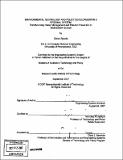| dc.contributor.advisor | Nicholas A. Ashford. | en_US |
| dc.contributor.author | Electris, Christi | en_US |
| dc.contributor.other | Massachusetts Institute of Technology. Technology and Policy Program. | en_US |
| dc.date.accessioned | 2008-05-19T16:15:55Z | |
| dc.date.available | 2008-05-19T16:15:55Z | |
| dc.date.copyright | 2007 | en_US |
| dc.date.issued | 2007 | en_US |
| dc.identifier.uri | http://hdl.handle.net/1721.1/41766 | |
| dc.description | Thesis (S.M.)--Massachusetts Institute of Technology, Engineering Systems Division, Technology and Policy Program, 2007. | en_US |
| dc.description | Includes bibliographical references (p. 256-270). | en_US |
| dc.description.abstract | In order to surmount the barriers to transboundary integration and coordination of environmental technology and regulatory policy in Southeastern Europe, the environmental capabilities and needs of the region are discussed, and a regional cooperation and coordination systems framework is developed. The thesis focuses on a case study of transboundary water resource management of the Mesta/Nestos River Basin between Bulgaria and Greece is presented in order to understand the coordination problems between a particular locality's level of integration in environmental technology development and use, and environmental regulatory policy, as well as the barriers to cooperation between two localities sharing a transboundary resource. For the case study, the physical characteristics and environmental stresses on the basin are described in detail. Next the policy governing local water resource management and environmental technology development is reviewed in terms of national laws and regulations, the bilateral diplomatic agreements, and the EU framework that drives much of the current activity in the basin today. Finally, the gaps in current policy and the barriers to coordinating water resource-related technology policy and environmental regulatory policy development are analyzed. The end result is a set of recommendations pertaining to the particular basin, but which can be generalized to other basins in the region. The focus is primarily on the coordination in both countries at the local and transboundary levels, but will also be explored within the context of the nation-wide and region-wide levels. | en_US |
| dc.description.abstract | (cont.) Through this narrow case study, insight is gained as to how environmental technology policy can be coordinated with regulatory policy to surmount the obstacles faced in water resource management and the broader context, and how the institutional and legal framework in place affects the regulatory scheme and in turn the technology placement in both countries. | en_US |
| dc.description.statementofresponsibility | by Christi Electris. | en_US |
| dc.format.extent | 270 p. | en_US |
| dc.language.iso | eng | en_US |
| dc.publisher | Massachusetts Institute of Technology | en_US |
| dc.rights | M.I.T. theses are protected by
copyright. They may be viewed from this source for any purpose, but
reproduction or distribution in any format is prohibited without written
permission. See provided URL for inquiries about permission. | en_US |
| dc.rights.uri | http://dspace.mit.edu/handle/1721.1/7582 | en_US |
| dc.subject | Technology and Policy Program. | en_US |
| dc.title | Environmental technology and policy development in a regional system : transboundary water management and pollution prevention in southeastern Europe | en_US |
| dc.type | Thesis | en_US |
| dc.description.degree | S.M. | en_US |
| dc.contributor.department | Massachusetts Institute of Technology. Engineering Systems Division | |
| dc.contributor.department | Technology and Policy Program | |
| dc.identifier.oclc | 226294278 | en_US |
